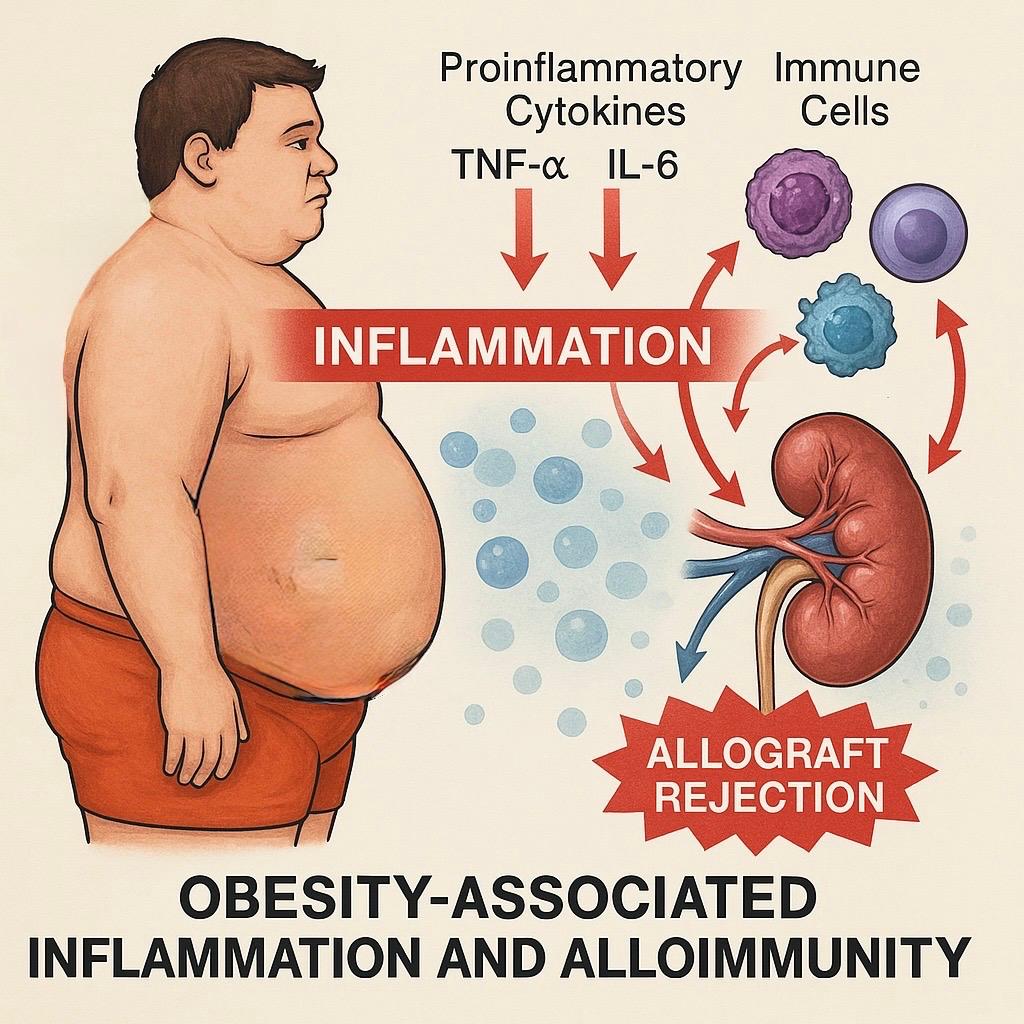By: Dr. Marco V. Benavides Sánchez.
In recent years, obesity has evolved from a simple metabolic condition to a key factor in chronic inflammation and adverse immune responses. In this context, the recent study titled “Obesity-associated Inflammation and Alloimmunity”, published in Transplantation by Zhou et al., provides a profound and illuminating insight into the relationship between obesity and alloimmunity. Their work not only expands our understanding of these processes but also raises important questions about the future of organ transplantation and personalized medicine.
Obesity as a Chronic Inflammatory State
It has long been known that obesity generates a persistent inflammatory state in the body. This phenomenon is primarily driven by the activation of the innate immune system and the release of proinflammatory cytokines such as tumor necrosis factor alpha (TNF-α), interleukin-6 (IL-6), and interleukin-1β (IL-1β). This inflammatory environment not only contributes to cardiovascular and metabolic diseases but also has a direct impact on the adaptive immune response.
What is novel about Zhou and his team’s study is the demonstration of how this obesity-associated inflammation can negatively influence alloimmunity, that is, the body’s response to transplanted tissues or organs. This finding is crucial for understanding why obese patients have a higher risk of organ transplant rejection and how therapeutic strategies could be optimized to improve their prognosis.
Alloimmunity and Transplantation: A Growing Problem
Rejection of transplanted organs is one of the main barriers in transplant medicine. The research by Zhou et al. highlights that obesity not only exacerbates the inflammatory response in the recipient organism but also affects antigen presentation and T cell activation, key elements in alloimmunity.
One of the most concerning aspects of this phenomenon is that obesity induces changes in the immunological microenvironment, promoting a more aggressive response against the transplanted tissue. In other words, the immune system of obese patients reacts more intensely to the graft, increasing the risk of rejection and decreasing the lifespan of the transplanted organ.
Clinical Implications and Future Lines of Research
The findings of Zhou and his team underscore the importance of considering obesity as an immunological risk factor in the context of transplantation. This could lead to significant changes in patient selection and the design of more effective immunosuppressive strategies.
Furthermore, this study opens the door to new lines of research. One of them is the possibility of developing therapies specifically aimed at modulating inflammation in obese patients before and after transplantation. This could include everything from dietary and lifestyle changes to the use of immunomodulatory drugs that reduce the inflammatory response without compromising the immunosuppression necessary to prevent rejection.
Another promising prospect is research into specific inflammatory biomarkers in obese patients. Identifying specific immunological profiles could help predict which patients are at higher risk of rejection and tailor treatments accordingly.
Conclusion: A Paradigm Shift in Transplant Medicine
The “Obesity-Associated Inflammation and Alloimmunity” study represents a significant advance in understanding the impact of obesity on the immune response, especially in the context of organ transplantation. The authors have managed to accurately and substantiate the relationship between obesity-induced chronic inflammation and alloimmunity, providing valuable data for the medical and scientific community.
As obesity continues to rise globally, these findings become even more relevant. Adapting clinical practices to this new reality could improve organ transplant survival and improve patients’ quality of life. Thus, this study not only serves as a wake-up call to an emerging problem but also serves as a guide for more effective and personalized future medical interventions.
Original article
Zhou, Hao MD, PhD1; Gizlenci, Merih MD Candidate1,2; Xiao, Yao MD1; Martin, Friederike MD1,3; Nakamori, Keita MD1,4; Zicari, Elizabeth M. BSc1,5; Sato, Yuko PhD1; Tullius, Stefan G. MD, PhD1. Obesity-associated Inflammation and Alloimmunity. Transplantation 109(4):p 588-596, April 2025. | DOI: 10.1097/TP.0000000000005183
#Transplantation #Medicine #Surgery #Medmultilingua


Leave a Reply